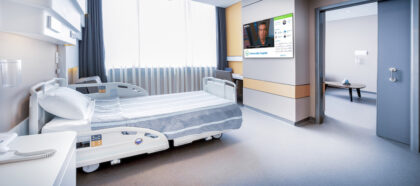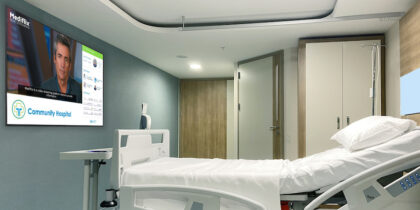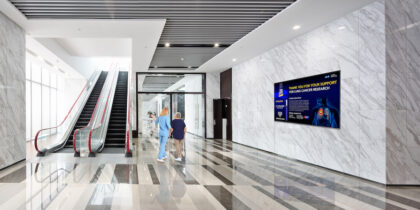Hospitals and other large healthcare facilities depend on massive amounts of fast, reliable data storage. All the testing, imaging and historical data adds up, and clinicians and administrators need to be able to collect and review that data securely, as quickly as possible, at the moment of need.
The latest generation of scanning and diagnostic systems can provide greater insights than ever, but that level of detail creates significantly more data. Now, AI-powered tools are poised to increase the demand for storage even further.
Healthcare data often needs to be shared among caregivers, which further increases the need for storage. Long-term nursing facilities, for instance, need to store and track electronic health records (EHRs) complete with high-resolution radiography and scans, and periodically update these records.
To manage all of this data, healthcare facilities rely on mission-critical IT systems, huge server rooms, and massive data centers running 24/7. Solid-state drives (SSDs), including the Samsung PM9A3 and PM893, are well-suited for the task, delivering consistently increased storage capacity, performance and endurance at a significantly lower cost compared to a few years ago.
More reliable than hard disk drives
In healthcare, downtime is not an option, and in time-sensitive situations, like the operating room or the emergency department, inadequate data access can have dire consequences. Traditional hard disk drives (HDDs) feature a lot of moving parts, including motors, magnetic platters and actuators that control mechanical arms to read and write data. In a data center environment, where storage devices run 24 hours a day, seven days a week, failure can derail every part of the organization, from patient care to billing to administration.
Exponentially greater reliability is only one of the reasons SSDs are the right choice for healthcare data center and system use cases. Other key factors include:
- Size. HDDs can take up significantly more space than SSDs. While SSDs come in multiple form factors, NVMe® SSDs in the M.2 format are approximately the same size as a computer memory stick, allowing for easier space planning and drive density.
- Lower TCO. Another benefit of SSDs over mechanical HDDs is less heat, which reduces cooling costs at the data center. Samsung SSDs are easy to manage using our intuitive tools, saving time and effort. Plus, Samsung data center SSDs’ reliability means less downtime, which translates to lower maintenance and replacement costs.
- Durability and shock resistance. Without any moving parts, SSDs are immune to most physical shocks. While this is less of a concern in the data center, it speaks to SSDs’ higher reliability. Also, for drives installed locally that may be moved or subject to rough handling, SSDs deliver reliability HDDs only dream of.
Still, for many users, there’s one more category that matters when dealing with huge volumes of data—one in which even the fastest, most capable HDD can’t hope to compete: speed.
An avid speed-reader
SSDs are now several orders of magnitude faster than traditional HDDs. In clinical environments, people can’t afford to wait for answers, so quick performance is paramount. SSDs can offer huge speed increases, depending on their form factor, the type of silicon used, how it’s stored and the type of bus the drives are attached to.
In heavy-read use cases, such as database searching, an SSD’s fastest read rate far surpasses that of HDDs. For data centers using SATA interfaces, the Samsung PM893 reliably delivers sequential read/write speeds of up to 550/520 MB/s—up to 4 times the speed of a typical HDD. NVMe technology makes the PM9A3’s read/write speeds exponentially faster, reaching up to 6,900/4,100 MB/s with PCIe® Gen4.
Patient data demands higher security. Samsung SSDs deliver.
Healthcare data must be protected, as it often contains personally identifiable information (PII), financial details, and even intellectual property. HIPAA requires privacy protections, and patients expect hospitals and caregivers to make compliance a top priority. SSDs help ensure data security in two fundamental ways.
- First, Samsung SSDs provide hardware-based encryption, to ensure that only users with the right credentials can access the data. At the same time, Samsung SSDs’ speed makes the encryption and decryption processes much faster than with HDDs, protecting critical information without slowing users down.
- Second, security also requires resilience. Samsung data center SSDs have built-in power loss protection to prevent data corruption, along with end-to-end data protection that ensures consistency, reliability, and maximum availability.
Samsung can assure greater drive performance and security as a premier manufacturer of V-NAND, the flash memory chips used in SSDs. Samsung drives are designed to be reliable and high-performing from the start, engineered to exact specifications and come with competitive warranties, so you can be confident that Samsung SSDs will be here to power better patient care for the long haul.
Choosing the right SSD depends on your application. We’ve made it easy to learn about your options here — so you can securely access all the data you need, the moment you need it.







